
Dunja is a 1955 Austrian historical drama film directed by Josef von Báky and starring Eva Bartok, Karlheinz Böhm, Ivan Desny and Walter Richter. It is an adaptation of the shorty story The Station Master by Alexander Pushkin, which had previously been made into the 1940 film Der Postmeister by Gustav Ucicky.
Mozart is a 1955 Austrian drama film directed by Karl Hartl and starring Oskar Werner, Johanna Matz and Gertrud Kückelmann. It is also known by the alternative title The Life and Loves of Mozart. It was entered into the 1956 Cannes Film Festival. The plot explores the mental state of Mozart during production of his final opera The Magic Flute. Werner's portrayal of Mozart was unusual for the time in playing him as a cheerful and easygoing young man, reflecting the postwar optimism of the newly restored Austrian Republic.
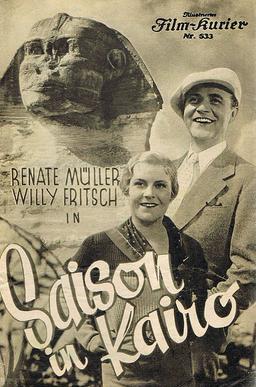
Season in Cairo is a 1933 German musical comedy film directed by Reinhold Schünzel and starring Renate Müller, Willy Fritsch and Gustav Waldau. A French-language version Idylle au Caire was released, also featuring Müller. The film's sets were designed by the art directors Robert Herlth and Walter Röhrig. It was shot on location in Egypt at Giza and Cairo, with interior filming taking place at the Babelsberg Studios in Berlin.
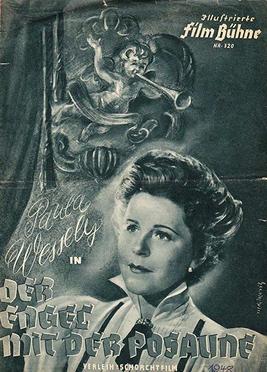
The Angel with the Trumpet is a 1948 Austrian historical drama film directed by Karl Hartl and starring Paula Wessely, Helene Thimig and Maria Schell. It is based on the novel of the same name by Ernst Lothar. The film was remade in Britain in 1950, under the same title.
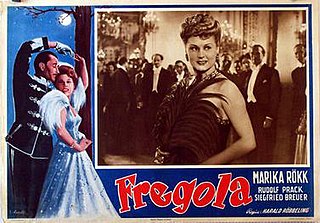
Fregola is a 1948 Austrian musical film directed by Harald Röbbeling and starring Marika Rökk, Rudolf Prack and Siegfried Breuer. It was a comeback film for Rökk, one of the most popular stars of the Third Reich, who hadn't made a film since 1944. It was shot at the Sievering Studios in Vienna. The film was released on the day of Christmas 1948 in Vienna, and on the 4th of July 1949 in Munich.

Victoria in Dover is a 1936 German romantic comedy film directed by Erich Engel and starring Jenny Jugo, Olga Limburg and Renée Stobrawa. It is based on a play by Geza Silberer. It was shot at the Babelsberg Studios in Potsdam and the Tempelhof Studios in Berlin and premiered at the city's Gloria-Palast. The film was remade in 1954 with Romy Schneider.
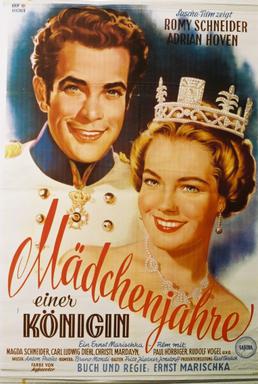
Victoria in Dover is a 1954 Austrian historical romantic comedy film directed by Ernst Marischka and starring Romy Schneider, Adrian Hoven and Magda Schneider. It is a remake of the 1936 Erich Engel film Victoria in Dover, which was based on a 1932 play by Sil-Vara. Romy Schneider's performance as a spirited young royal was a lead-in to her best known role in Sissi and its sequels, although Marischka had originally intended to cast Sonja Ziemann as Victoria.
His Daughter is Called Peter is a 1955 Austrian drama film directed by Gustav Fröhlich and starring Sabine Eggerth, Wolf Albach-Retty and Josef Meinrad. The film was a remake of a 1936 Austrian film of the same name. Both films were based on a novel by Edith Zellweker.
Aglaja Schmid (1926–2003) was an Austrian stage and film actress. She was married to the theatre and film director Rudolf Steinboeck.

The Merry Farmer is a 1951 Austrian musical comedy film directed by Georg Marischka and starring Paul Hörbiger, Erich Auer, Heinrich Gretler. An operetta film, it is an adaptation of the 1907 operetta The Merry Farmer composed by Leo Fall.

Tante Jutta aus Kalkutta is a 1953 West German comedy film adapted from the play of the same name. It was directed by Karl Georg Külb and starred Viktor Staal, Ida Wüst, and Ingrid Lutz.
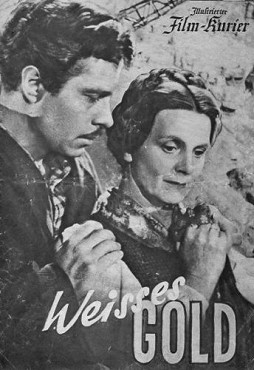
White Gold is a 1949 Austrian drama film directed by Eduard von Borsody and starring Heinrich Gretler, Alma Seidler and Robert Freitag.
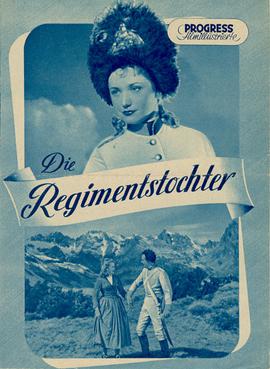
Daughter of the Regiment is a 1953 Austrian historical comedy film directed by Georg C. Klaren and starring Aglaja Schmid, Robert Lindner, and Hermann Erhardt. It is based on the storyline of the 1840 opera La fille du regiment by Gaetano Donizetti. The plot had previously been used for a 1929 silent film and a 1933 sound film, and another film version was made during 1953 by Géza von Bolváry.

Your Heart Is My Homeland is a 1953 Austrian-West German drama film directed by Richard Häussler and starring Inge Egger, Erwin Strahl and Viktor Staal. It is also known as Magdalena Percht after the lead character. It is part of the trend of post-war heimatfilm. It was shot at the Bavaria Studios in Munich and on location in Salzburg.
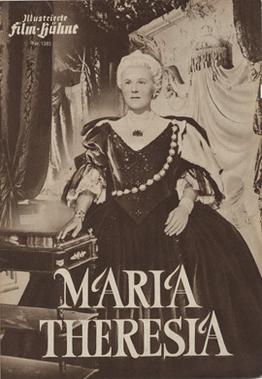
Maria Theresa is a 1951 Austrian historical drama film directed by Emil E. Reinert and starring Paula Wessely, Fred Liewehr and Marianne Schönauer. It portrays the life of the eighteenth century Habsburg Empress Maria Theresa.
Twentieth of July is a 1947 novella by the Austrian writer Alexander Lernet-Holenia. During the Nazi era an aristocratic Austria woman lends her papers to a Jewish acquaintance, only to find herself without an identity when the woman dies.
Rudolf Steinboeck (1908–1996) was an Austrian theatre actor and director. He also directed and acted in several films. He was married to the actress Aglaja Schmid.

Dear Friend is a 1949 Austrian drama film directed by Rudolf Steinboeck and starring Johannes Heesters, Vilma Degischer and Erik Frey.
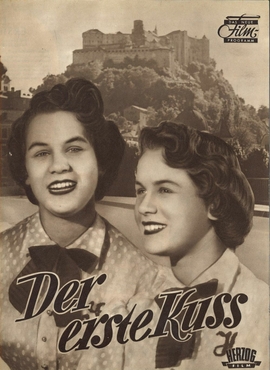
The First Kiss is a 1954 Austrian-West German comedy film directed by Erik Ode and starring Isa Günther, Jutta Günther and Erich Auer. It was shot at the Salzburg Studios and on location around the city and the nearby area. The film's sets were designed by the art director Gustav Abel.

The Doctor's Secret is a 1955 Austrian-West German crime drama film directed by August Rieger and Karl Stanzl and starring Hilde Krahl, Ewald Balser and Erik Frey. It was shot at studios in Vienna. The film's sets were designed by art director Fritz Jüptner-Jonstorff.















